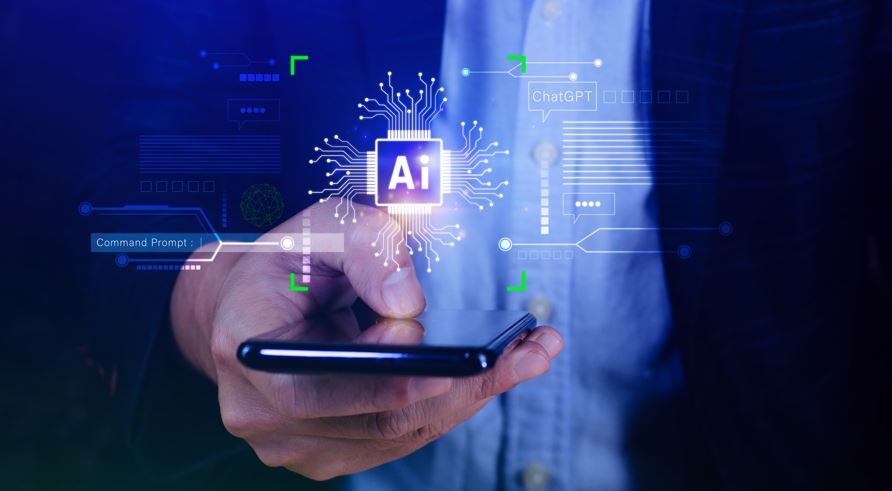The Future of AI in Smartphones Trends to Watch in 2024
10th September 2024
Peter Samos
Artificial intelligence has emerged as a prominent feature in smartphones, fundamentally transforming the dynamics of human-device interactions. The current trends in AI for smartphones encompass a spectrum of functionalities such as personalization and bolstered security measures, thereby reshaping the everyday usage patterns of these devices.
Looking towards the year 2024, the forthcoming prognostications for AI in smartphones elicit heightened anticipation, with projected advancements in areas like virtual assistants, biometric technologies, and seamless integration with other smart devices. However, amidst these promising developments, concerns loom regarding data privacy, potential job displacements, and the growing reliance on technology.
The impending evolution of AI in smartphones is poised to usher in a new era of technological innovation, influencing various facets of our lives.
What Are the Current Trends in AI for Smartphones?
The ongoing developments in Artificial Intelligence (AI) for smartphones indicate a swift evolution, marked by state-of-the-art advancements that are reshaping the mobile technology landscape. AI's continued influence is transforming smartphone functionalities, with substantial innovations in data processing, connectivity, and mobile devices taking center stage.
The incorporation of AI into smartphones has facilitated improved user experiences, characterized by the prevalence of features like personalized recommendations, voice assistants, and efficient data management. AI's capacity to analyze extensive data sets in real-time has resulted in enhanced performance and seamless connectivity. As mobile devices grow smarter and adept at learning from user interactions, the overall levels of user satisfaction and productivity are experiencing significant enhancements with each progressive innovation.
1. Personalization
Personalization in artificial intelligence (AI) for smartphones represents a prominent trend emphasizing the enhancement of user experience through customized services and content. This approach utilizes advanced machine learning techniques and innovative data processing methodologies to elevate user engagement and satisfaction.
Through the analysis of user preferences, behaviors, and patterns, AI algorithms have the capacity to generate personalized recommendations and suggestions, thereby enhancing the intuitiveness and efficiency of the smartphone experience. Given the expanding volume of user-generated data, personalized AI ensures that individuals receive pertinent information and services, consequently fostering heightened user retention and loyalty. As AI continues its progression, the sophistication of personalization in smartphones is poised to advance further, catering adeptly to the distinct needs and preferences of each individual user.
2. Augmented Reality
Augmented reality represents a burgeoning trend in artificial intelligence for smartphones, utilizing neural networks and advanced technology to deliver immersive user experiences. By merging the virtual and physical worlds, augmented reality enhances user engagement and interaction.
The incorporation of virtual reality elements introduces an additional layer of complexity to augmented reality experiences on smartphones. This amalgamation creates a seamless integration of the real environment with digitally generated elements, offering users a truly interactive and dynamic encounter.
The continual progress in augmented reality technology enables users to explore new frontiers in entertainment, education, and practical applications such as navigation and design. As these technologies advance, the boundaries between the physical and digital realms become increasingly blurred, presenting users with limitless possibilities to interact with their devices in innovative and captivating ways.
3. Enhanced Security
The integration of AI-driven enhanced security measures represents a pivotal element in contemporary smartphones, emphasizing biometric security, adherence to data privacy regulations, and the implementation of cybersecurity protocols. These technological advancements are designed to address privacy apprehensions and ensure the formidable safeguarding of user data.
Biometric security functionalities, such as facial recognition and fingerprint scanning, have become customary in smartphones, furnishing users with a secure and convenient means of accessing their devices. Beyond fortifying security, these features contribute to a personalized and user-centric experience.
Adherence to data privacy regulations is imperative for cultivating user trust and aligning with legal stipulations. By instituting resilient cybersecurity protocols, user data is shielded from potential threats and cyber assaults, thereby establishing a secure and dependable mobile environment.
4. Improved Battery Life
The enhancement of battery life in smartphones through the integration of AI and technological advancements is a significant area of focus. Progress in connectivity, sustainability, and energy efficiency plays a vital role in improving the overall user experience.
With the increasing demand for extended battery life in smartphones, AI technologies are becoming increasingly important in optimizing power consumption. Through the utilization of AI algorithms, smartphones can intelligently regulate background processes, resulting in prolonged standby durations and enhanced battery lifespan. Moreover, the adoption of sustainable practices such as the use of eco-friendly materials in battery manufacturing and efficient energy management practices further reinforces the commitment to environmental stewardship.
The continuous development of connectivity standards like 5G not only boosts data transfer speeds but also ensures optimized power utilization, ultimately delivering extended battery performance benefits to users.
What Are the Future Predictions for AI in Smartphones?
The forthcoming projections for Artificial Intelligence (AI) in smartphones depict a landscape characterized by advanced capabilities and transformative technologies that are poised to redefine user interactions by the year 2024. Envisioned developments encompass predictive analytics, intelligent assistants, and the integration of emerging technologies.
These advancements are anticipated to overhaul the manner in which individuals interact with their devices, facilitating more seamless and personalized experiences. The implementation of predictive analytics will enable smartphones to foresee user needs and preferences, thereby engendering a more intuitive and efficient user interface. Intelligent assistants are projected to increase in sophistication, offering proactive suggestions and adapting to users' preferences over time. Furthermore, with emerging technologies such as augmented reality and 5G connectivity gaining prevalence, smartphones will proffer enhanced functionalities that were previously relegated to the realms of science fiction.
1. More Advanced Virtual Assistants
The future of artificial intelligence (AI) in smartphones foresees the development of more sophisticated virtual assistants that utilize voice recognition and natural language processing to seamlessly meet user expectations. A primary focus lies in enhancing the user interface through intuitive interactions.
With technological advancements, virtual assistants are progressively becoming more intelligent, adapting to users' natural language patterns and preferences. Progress in voice recognition technology has enabled smartphones to accurately interpret and respond to verbal commands. Users now anticipate smooth integration between virtual assistants and other smartphone functions to efficiently streamline daily tasks.
Undoubtedly, the significance of a user-friendly interface cannot be overstated, as it plays a pivotal role in enhancing the overall user experience and fostering increased engagement with AI-powered features. As these assistants continue to evolve, developers are consistently enhancing their capabilities to provide personalized and efficient assistance.
2. Increased Use of Biometric Technology
The anticipated evolution of AI in smartphones indicates an increasing dependence on biometric technology, especially facial recognition, to enhance data security and user authentication procedures. Progress in biometric security protocols is forthcoming.
Facial recognition systems have transformed the user-device interaction landscape, providing a seamless experience through visual recognition. This technology not only offers a convenient method for unlocking smartphones but also bolsters security measures by confirming the user's identity. With the integration of this feature by a growing number of smartphone manufacturers, consumers are embracing the additional reassurance of safeguarding their personal data. Ongoing developments in biometric security improvements strive to enhance the security and accuracy of these systems, ensuring the protection of user data from potential breaches.
3. Integration with Other Devices
The forthcoming integration of artificial intelligence (AI) into smartphones alongside other devices such as IoT gadgets, wearables, and smart home systems is positioned to establish a seamless interconnected ecosystem. This amalgamation of enhanced connectivity and smart home integration is set to redefine user experiences.
The incorporation of artificial intelligence into smartphones will enable users to effortlessly oversee a range of smart devices in their residences by simply using their phones. Through the interaction with IoT gadgets, wearables, and smart home systems via smartphones, individuals will be able to tailor their living environments to align with their preferences. This heightened level of connectivity is anticipated to facilitate more convenient and effective ways of managing daily activities, thereby amplifying the overall user experience and actualizing smart living for a broad spectrum of users.
4. Smarter Cameras
The future of AI in smartphones indicates a shift towards the advancement of camera technology through the integration of machine vision and image recognition technologies. Significant enhancements in hardware are expected to be instrumental in augmenting the capabilities of smartphone cameras.
AI developments are poised to bring about a transformation in the realm of photography within smartphones, enabling users to capture exceptional images with unparalleled ease. These innovations enable devices to automatically detect scenes and adjust settings, resulting in optimal outcomes even under challenging circumstances.
The proliferation of AI-driven features such as portrait mode, night sight, and scene recognition signifies a growing trend towards the seamless integration of intelligent functionalities into everyday photography experiences for users. As technology progresses, the convergence of AI and smartphone cameras is anticipated to redefine the boundaries of visual storytelling.
What Are the Potential Benefits of AI in Smartphones?
The potential benefits of AI in smartphones are vast, offering improvements in efficiency, enhanced user experience, and personalized interactions that enhance user engagement. The innovative applications of AI bring substantial value to smartphone users.
Through the utilization of AI, smartphones can streamline processes, automate tasks, and adjust to user behavior, thereby optimizing performance and increasing productivity. The incorporation of AI algorithms allows smartphones to provide customized recommendations, intelligent assistance, and predictive capabilities tailored to individual preferences, resulting in a seamless user experience. These advancements in AI technology not only simplify daily tasks but also facilitate stronger connections between users and their devices by fostering more intuitive and personalized interactions.
1. Improved Efficiency and Productivity
AI-enabled smartphones offer enhanced efficiency and productivity by leveraging automation, seamless connectivity, and predictive maintenance capabilities. The incorporation of machine learning algorithms serves to optimize performance and streamline various tasks.
This heightened efficiency is further reinforced by the AI capabilities within smartphones, which are capable of learning user behaviors and preferences over time, thereby personalizing experiences and anticipating user needs. Through predictive maintenance functionalities, these devices can proactively address potential issues, subsequently reducing downtime and improving overall reliability.
Furthermore, the advancements in connectivity facilitated by AI-powered smartphones allow for seamless integration with other intelligent devices, establishing a unified ecosystem that promotes heightened convenience and control. The automated functions integrated within these devices not only save time but also simplify intricate processes, enableing users to concentrate on more complex tasks with greater ease.
2. Enhanced User Experience
The integration of artificial intelligence (AI) in smartphones enhances the user experience through personalized interactions, user-friendly interfaces, and efficient voice interfaces. The emergence of ambient computing further enhances the overall user experience.
This technology allows smartphones to acquire knowledge of user preferences over time and customize recommendations accordingly, resulting in a truly personalized experience. Through the analysis of user behavior and patterns, AI can propose relevant applications, services, and content, thereby enhancing the intuitiveness and user-friendliness of the device.
Voice-driven interfaces powered by AI enable users to engage with their smartphones hands-free, thus improving convenience and accessibility. The incorporation of ambient computing seamlessly links various smart devices, establishing a cohesive ecosystem that adjusts to users' requirements and enriches their daily routines.
3. Better Personalization
AI-driven personalization in smartphones offers customized experiences based on user preferences, optimized data processing, and context-aware services that improve user engagement. Natural language processing further enhances the personalization capabilities.
These tailored experiences transform the user-device interaction, establishing a seamless and intuitive connection. Through the utilization of AI technology, smartphones can forecast user behaviors, preempt needs, and offer proactive recommendations. The integration of natural language processing facilitates more human-like communication between users and their smartphones, thereby enriching the overall user experience. With ongoing learning and adjustment, AI-powered smartphones continuously refine their personalization functionalities, elevating each interaction to a more personalized and responsive level.
What Are the Potential Concerns with AI in Smartphones?
The integration of AI in smartphones presents numerous advantages, but it also raises concerns regarding privacy, security, user acceptance, and ethical implications. Addressing these challenges is essential to ensure the responsible deployment of AI on mobile devices.
Privacy concerns are a notable issue since AI collects personal data for customization purposes. Users may express apprehension about the security of their information stored on AI-enabled devices.
Barriers to user adoption stem from a lack of comprehension or mistrust towards AI functionalities. Ethical quandaries also surface, particularly concerning the ethical utilization of data gathered by AI algorithms and the potential societal repercussions.
Effective handling of these challenges necessitates a comprehensive approach that includes technological enhancements, rigorous policies, and user education.
1. Privacy and Security Issues
Privacy and security concerns related to AI-equipped smartphones encompass issues concerning data privacy regulations, vulnerabilities in biometric authentication, and broader data security apprehensions. It is imperative to address these concerns in order to protect user information effectively.
The integration of AI technology in smartphones has facilitated the collection, analysis, and utilization of extensive personal data, presenting both opportunities and risks in the realm of privacy. The implementation of stringent data privacy regulations is vital to safeguard user information from being misused or disclosed without proper consent.
The vulnerabilities present in biometric authentication systems, such as fingerprint or facial recognition technologies, underscore the necessity for enhanced security measures to mitigate unauthorized access. The adoption of robust encryption protocols and the regular dissemination of security updates are essential in maintaining data integrity and confidentiality within AI-driven smartphone environments.
2. Job Displacement
The advancements in artificial intelligence within smartphones have prompted concerns regarding potential job displacement as a result of automation and technological disruptions. To address these challenges, it is imperative to navigate the continuously evolving regulatory environment and cultivate strategic industry partnerships to mitigate the impact on employment.
As artificial intelligence continues to optimize processes and improve user interactions within the smartphone sector, the prospect of automation replacing certain human tasks becomes increasingly prominent. While technological disruptions are instrumental in fostering innovation, they also possess the capacity to reshape the dynamics of the workforce.
To effectively tackle these issues, it is necessary for stakeholders to engage in close collaboration to adapt to the shifting landscape and ensure that the advantages of technology are leveraged while concurrently safeguarding employment opportunities. Striking a balance between efficiency gains and socio-economic considerations demands a comprehensive approach, encompassing initiatives such as upskilling programs, regulatory frameworks, and establishment of strategic alliances within the industry.
3. Dependence on Technology
The increased reliance on technology-driven solutions within smartphones has raised concerns regarding user adoption challenges, shifts in consumer behavior, and the evolving expectations of users. It is essential to strike a balance between technological advancements and user requirements to facilitate sustainable integration.
With the proliferation of AI-powered smartphones across various aspects of daily life, users are not only confronted with the need to adapt to these sophisticated technologies but also with the responsibility of enhancing their proficiency to fully leverage the capabilities of these devices. The continuous evolution of user preferences and expectations within this technology-oriented environment underscores the importance for tech companies to remain attuned to these dynamic shifts. Effectively addressing these challenges necessitates that developers align their innovations with user preferences, thereby ensuring a seamless and user-centric smartphone experience.















